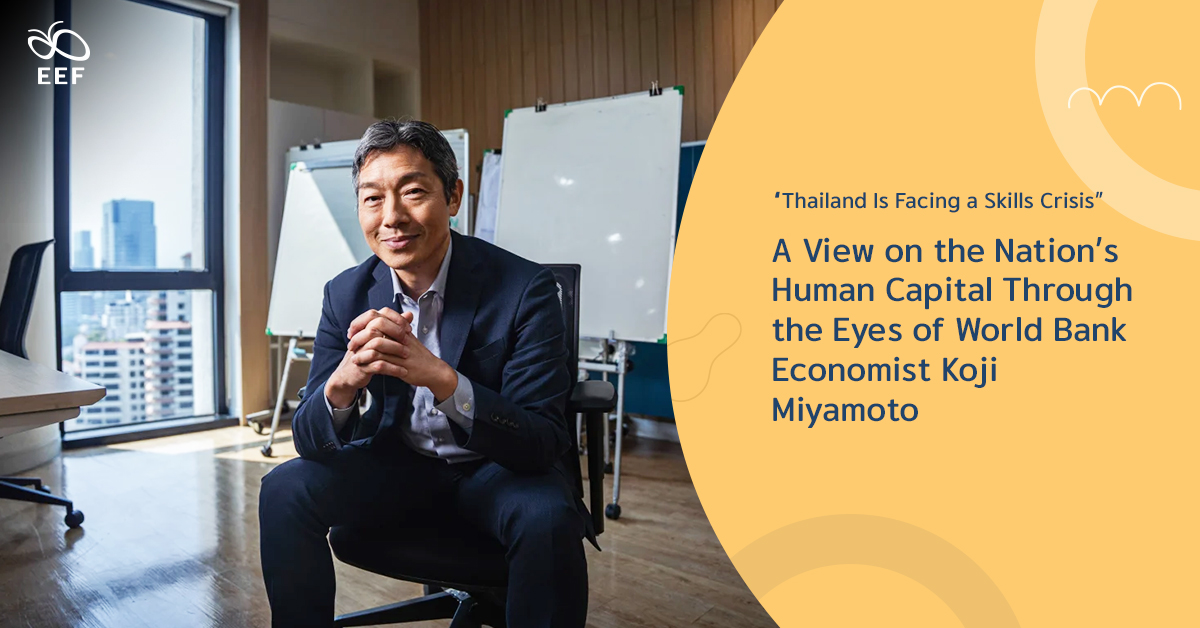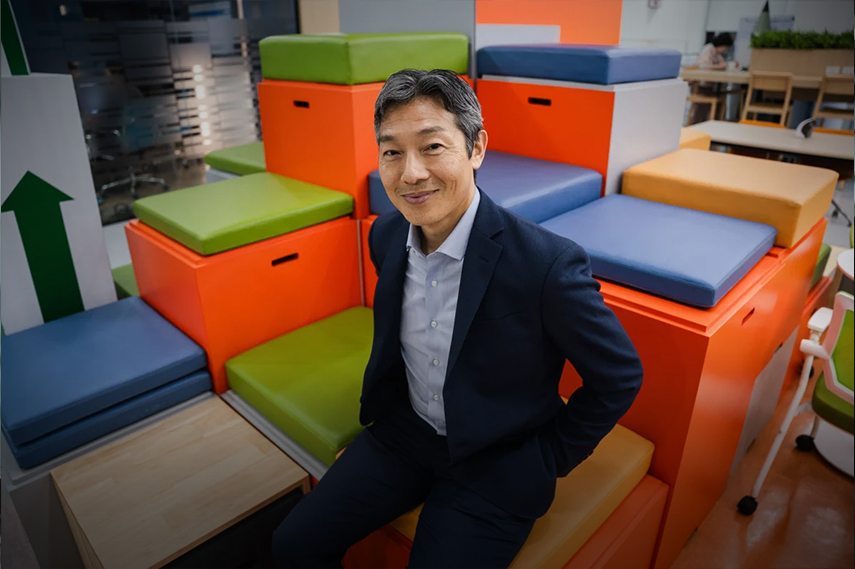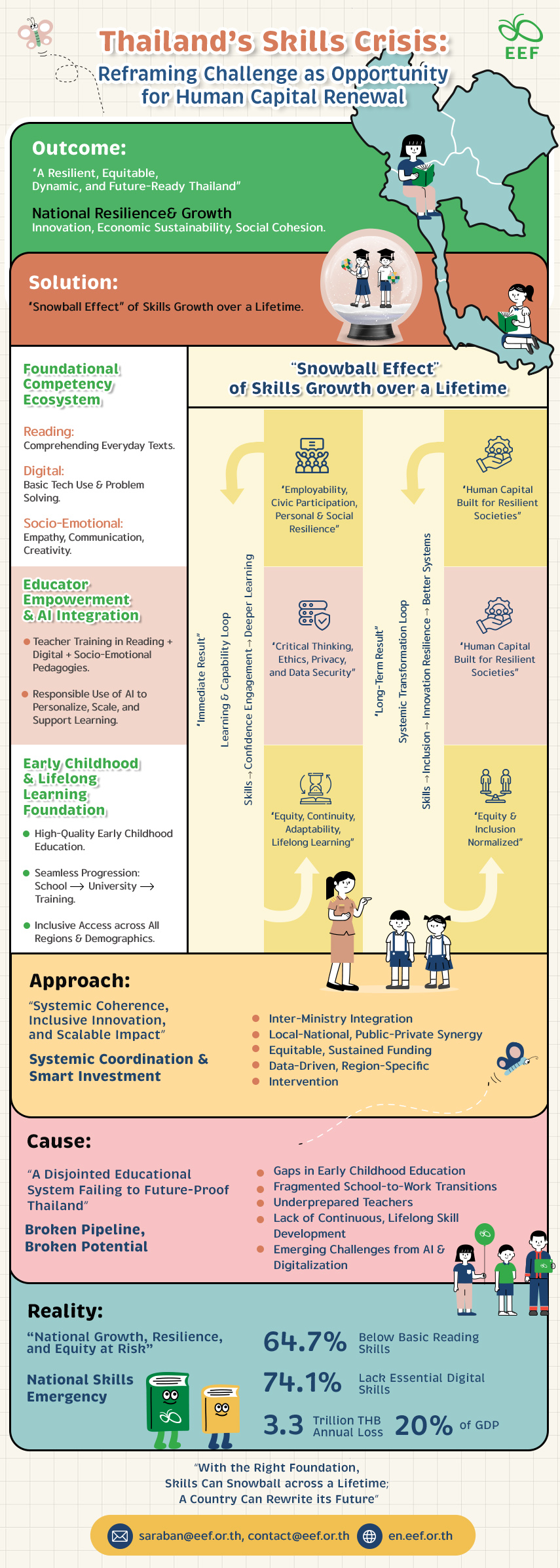
Thailand faces a critical skills crisis: 64.7% of youth and working-age adults fall below basic literacy levels, and 74.1% lack essential digital skills, according to a 2022 national assessment released in 2024 by the World Bank and the Equitable Education Fund (EEF) Thailand. This stark reality reveals that much of the population struggles with fundamental reading and computer tasks, skills that are indispensable for personal development, employability, and active civic participation. Without a solid foundation in reading, digital, and socio-emotional competencies, acquiring advanced abilities becomes nearly impossible, undermining both individual potential and the country’s resilience. To explore solutions, the EEF engaged with Koji Miyamoto, Senior Economist at the World Bank and lead author of the report.

Both Thai youth and adults lack the foundational skills essential for everyday life and workforce readiness. Reading involves understanding everyday texts, digital skills cover basic tool usage like online shopping and messaging, and socio-emotional skills include communication, empathy, and creativity. These competencies are vital across all sectors and occupations. Employers in Thailand and worldwide consistently identify these skills as drivers of productivity and innovation but report difficulty finding qualified candidates. It is worth mentioning that the World Bank–EEF report is not alone in highlighting this critical gap. Similar findings are reflected in the Adult Skills Assessment in Thailand (ASAT), which shows that over two-thirds of the population lack basic reading skills, while three-quarters fall short in digital skills. Reinforcing this, the 2022 PISA results reveal that nearly two-thirds of 15-year-olds perform below minimum standards in reading and mathematics, underscoring the scale and urgency of systemic reform.
This crisis stems from failures throughout Thailand’s lifelong human capital development, beginning in early childhood education where foundational competencies should first emerge and continuing through schools, universities, and workforce training. Neglect at any stage compounds challenges in acquiring more complex skills later, setting the stage for widespread deficiencies. A key factor is the preparedness of educators, who must go beyond subject knowledge to nurture essential life skills. Yet, without sufficient training and support, teachers are often ill-equipped to build these core competencies, impeding learners’ ability to thrive as adaptive, skilled adults in a rapidly evolving world.
The economic impact is substantial: the high proportion of workers lacking foundational skills translates into an estimated loss of approximately 3.3 trillion Thai Baht, or about 20% of Thailand’s GDP in 2022. This figure is conservative, capturing only lost income opportunities; the broader social costs extend to poorer health management and reduced civic participation, including volunteering and voting, amplifying long-term societal consequences.
Tackling this challenge demands shared responsibility among public, private, and civil society sectors, alongside parents and learners. Key strategies include: 1. investing early in childhood skill development to ignite a “snowball” effect that accelerates growth throughout education; 2. empowering educators through specialized pedagogical training to cultivate core skills effectively; 3. creating seamless curriculum integration across educational levels to reinforce or address prior skill gaps; 4. strengthening local educational systems and partnerships by leveraging community insights alongside central resources; and 5. fostering close collaboration with the private sector to support teachers, provide resources, and offer training for mutual, sustained benefits. This multi-stakeholder synergy forms the foundation of a resilient, inclusive, and dynamic skill-building ecosystem.

The pervasive integration of AI into education presents both opportunities and challenges requiring careful management. AI assists teachers in designing personalized lessons and supports students with adaptive digital tools, exemplified by South Korea’s AI-driven educational content tailored to individual abilities. Maximizing AI’s benefits demands thorough training for educators in both technology and pedagogy. However, risks such as privacy breaches, data insecurity, academic dishonesty, and overreliance that may stifle critical thinking and creativity persist, echoing previous concerns from calculator use debates. Furthermore, AI-generated content can be inaccurate or misleading, making critical evaluation skills essential. Educators recognize these challenges but often lack the authority and resources to address them effectively, highlighting the urgent need for strong support systems to guide AI’s responsible use in education.
Thai government and policymakers acknowledge the urgency of strengthening foundational life skills, as reflected in strategic plans spanning education and training. The next critical step is practical, coordinated implementation involving agencies such as the Ministry of Education (MOE), Ministry of Higher Education, Science, Research and Innovation (MHESI), and Ministry of Labor (MOL) to ensure continuous skill development through horizontal integration. Equally important is vertical coordination among local governments, regional offices, the private sector, and civil society to maximize collective impact. Securing adequate funding through substantial investment and equitable cost-sharing remains essential to effectively address the skills crisis.
Thailand can draw valuable lessons from global educational models suited for both immediate adoption and long-term planning. Estonia’s digital educational transformation began in the mid-1990s with universal computer access and teacher training, culminating today in the AI Leap 2025 initiative that offers AI-powered learning tools through strong public-private partnerships. In the United States, many school districts have integrated Social and Emotional Learning (SEL) to develop students’ emotional and social skills alongside academics, a model currently piloted in Thailand’s vocational colleges with World Bank support. Globally, educational systems emphasize digital adaptation, personalized learning, such as India’s Teaching at the Right Level, and continuous teacher development, alongside SEL, illustrating a holistic approach Thailand can adopt to enhance foundational skills in an increasingly complex digital future.
Building on the 2022 nationwide assessment, an upcoming report will focus on essential life skills among working-age populations at the provincial level, with data collected in Phayao, Rayong, and Pattani. This localized insight will enable tailored recommendations addressing region-specific skill gaps, with findings expected between September and November 2025. Foundational life skills are society’s backbone, akin to the essential materials ensuring a building’s strength and resilience. Without them, individuals struggle to confront crises, adapt to shifting job demands, and contribute to innovation and national progress. Thailand’s 75-year partnership with the World Bank has fostered significant progress; current efforts concentrate on investing in these core skills through collaboration with the MOE’s Office of Vocational Education Commission (OVEC), the EEF, provincial governments, and the private sector. Together, they strive to enhance life skills quality and equity, empowering all generations to succeed in a rapidly changing world.

Thailand’s profound skills crisis, revealed through national assessments, highlights the urgent need for systemic reform spanning early childhood through adult education, centered on foundational competencies in reading, digital, and socio-emotional skills. Addressing this challenge requires coordinated action across government, educators, private partners, and communities to build a resilient, inclusive, and adaptive skill ecosystem. The rise of AI offers promising opportunities alongside significant risks that must be managed through strengthened educator training and robust support. Without immediate, sustained investment and collaborative effort, Thailand risks limiting its human capital potential, economic growth, and social well-being. Conversely, embracing holistic, evidence-based strategies and global best practices can secure a more equitable, dynamic future in which all citizens are equipped to navigate and flourish within an increasingly complex digital world.
All For Education is all about people; only when all is in for education is Education For All. Join the movement to reduce educational inequality. Support the EEF by donating to fund research, partnerships, and assistance for children, youth, and adults in need of educational support. Click the link to contribute today and help create a society where education is open and equal for all. Together, we can make a lasting impact.

